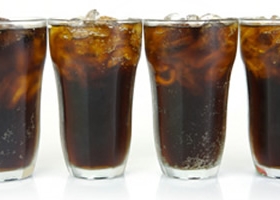Caffeine is everywhere. It is in everything from a cup of coffee to cold medicine to a can of soda. But is it good for our children?
 Caffeine is a drug that stimulates the central nervous system. At high levels it can cause jitteriness, nervousness, upset stomachs, headaches, difficulty concentrating and sleeping, and increased heart rate and blood pressure. Caffeine can also aggravate heart problems or nervous disorders, and cause withdrawal symptoms like headaches, muscle aches, temporary depression, and irritability.
Caffeine is a drug that stimulates the central nervous system. At high levels it can cause jitteriness, nervousness, upset stomachs, headaches, difficulty concentrating and sleeping, and increased heart rate and blood pressure. Caffeine can also aggravate heart problems or nervous disorders, and cause withdrawal symptoms like headaches, muscle aches, temporary depression, and irritability.
Parents have to be extra careful with how much caffeine their children are consuming because children are more vulnerable to the effects of caffeine — typically the lower the body weight the more sensitive somebody is to caffeine. Some experts recommend that children consume less than 45 milligrams of caffeine a day — equivalent to a can of soda or four milk chocolate bars.
Your best bet is to cut caffeine from your child’s diet entirely. So where do you start?
• Cut out soda. This has the added benefit of cutting out empty calories, preventing nutritional deficiencies, decreasing your child’s likelihood of becoming obese, and preventing cavities.
• Check the ingredient list on foods and beverages for caffeine. For example some brands of root beer have caffeine and others do not.
• Help your child avoid withdrawal symptoms. If your teen has a coffee habit, avoid withdrawal symptoms by helping them to cut back slowly. A good method is to substitute one drink per week with a caffeine-free alternative until your child has kicked the habit.
• Don’t sweat the small stuff. Don’t worry about the occasional piece of chocolate or cup of hot chocolate. There isn’t enough caffeine in these types of foods to be harmful.
For More Information:
